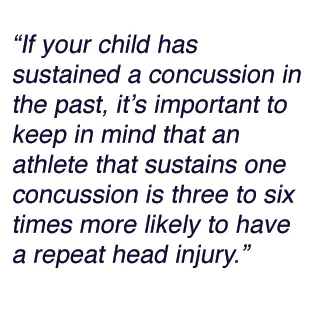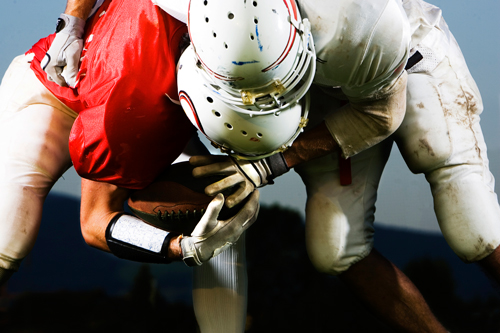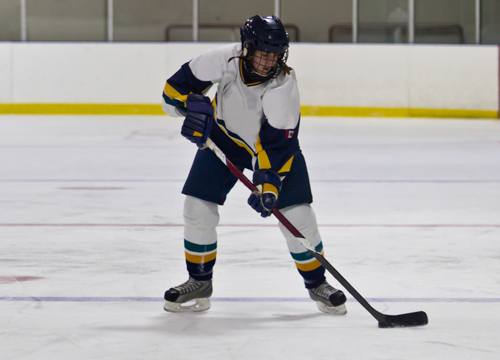
Feb 13, 2017 • 4 min read
Concussions: More Than a Bump on the Head
In recent years, more attention than ever has turned toward concussions, and parents of young athletes are–and should be–concerned about this often overlooked and underestimated injury. According to the Centers for Disease Control (CDC), concussion is one of the most commonly reported injuries in children and adolescents who participate in sports and recreation activities, accounting for 65 percent of the concussions treated each year in emergency departments.
 While many of these concussions may be considered mild medically, they can result in longer-term health consequences such as impaired thinking, memory problems and emotional or behavioral changes without proper treatment and recovery. The good news: 80 to 90 percent of concussions heal well, in approximately three weeks, if treated properly.
While many of these concussions may be considered mild medically, they can result in longer-term health consequences such as impaired thinking, memory problems and emotional or behavioral changes without proper treatment and recovery. The good news: 80 to 90 percent of concussions heal well, in approximately three weeks, if treated properly.
If your young athlete has sustained a concussion in the past, it’s important to keep in mind that an athlete that sustains one concussion is three to six times more likely to have a repeat head injury. If your child plays a high contact sport in particular, it’s important to be aware of concussion symptoms.
Common Concussion Myths
True or False:
- A concussion is just a bump on the head. False! Actually, a concussion is a traumatic brain injury which requires proper diagnosis and treatment. We’ve outlined many of the most common symptoms below.
- Loss of consciousness is necessary for a concussion to be present. False! The CDC reports that an estimated 1.6 to 3.8 million sports and recreation related concussions occur in the U.S. each year, and most (90 percent) don’t involve a loss of consciousness. Parents should also be on the lookout for non-sports related causes for concussion, like auto accidents, bike spills or simple stumbles and falls.
- A parent should awaken a child who falls asleep after a head injury. False! Current medical advice is that it is not dangerous to allow a child to sleep after a head injury once they have been medically evaluated. In fact, the best treatment for a concussion is rest, including sleep.
Concussion Symptoms
If your young athlete is hit in the head, falls or experiences a hit that causes the head to snap violently during an activity, watch carefully for the following symptoms:
- Confusion
- Disorientation
- Memory loss
- Slowed reaction times
- Emotional reactions
- Headaches
- Dizziness/nausea
If Your Young Athlete Has a Concussion
Through research and study, we’ve developed the REAP Concussion Management Program. REAP stands for:
- Remove from physical demands and reduce home stimulation and school/(mental) demands
- Educate the student athlete, families, educators, coaches and medical professionals on the story the symptoms are telling
- Adjust/Accommodate for the student athlete at home and at school
- Pace the student/athlete back to physical activity once they are 100% symptom free at home and at school.
 If your young athlete is diagnosed with a concussion, the single best thing to ensure complete recovery is doubling up on the R’s–reduce and rest. By rest, we mean not only physical rest, but mental as well. Your young athlete should avoid loud group functions (like dances or sporting events) limit video games, text messaging, social media and computer screen time and even reduce reading and homework. Since concussions will almost universally slow reaction time, driving should also be avoided until medically cleared. Most importantly, don’t let your young athlete convince you that resting later is OK–after the prom, after a big test, etc. It is imperative that they rest immediately.
If your young athlete is diagnosed with a concussion, the single best thing to ensure complete recovery is doubling up on the R’s–reduce and rest. By rest, we mean not only physical rest, but mental as well. Your young athlete should avoid loud group functions (like dances or sporting events) limit video games, text messaging, social media and computer screen time and even reduce reading and homework. Since concussions will almost universally slow reaction time, driving should also be avoided until medically cleared. Most importantly, don’t let your young athlete convince you that resting later is OK–after the prom, after a big test, etc. It is imperative that they rest immediately.
The biggest lesson learned from our research has been that parents should work to assemble a strong and caring team to manage and monitor the young athlete at home (parents and siblings), at school (teachers and friends), and in their extracurricular activities (coaches and advisors). Everyone must work together to encourage the young athlete to rest and heal and observe the child’s behavior to determine when they are back to “baseline” in all areas (behaviorally, emotionally and in thinking and personality) to determine when it is safe to return them to physical play.
Karen McAvoy is the Director at the Center for Concussion, Rocky Mountain Hospital for Children at Presbyterian/St. Luke’s Medical Center in Denver, Colorado. If you or someone you know has the need for well-coordinated concussion management, check out the REAP Program from the Rocky Mountain Hospital For Children and the AAP paper Returning to Learning Following a Concussion for more information.
